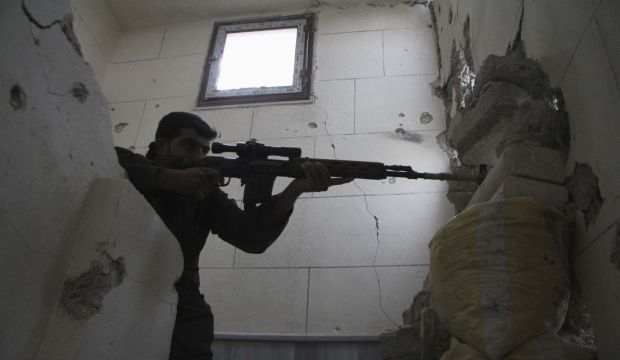
A Free Syrian Army fighter aims his weapon as he takes position in Aleppo’s Karm al-Jabal district on December 4, 2013. (Reuters/Saad AboBrahim)
Beirut, Asharq Al-Awsat—Syrian Druze rebel leaders have denied media reports that Islamist rebels are forcing Syrian Druze villages in Idlib to publicly embrace Islam. Earlier this week, The Times of Israel reported that “Al-Qaeda fighters in Syria forced residents of 14 Druze villages located in an isolated area to convert to Islam,” with this report later being picked up by international media.
In exclusive comments to Asharq Al-Awsat, a spokesman for the rebel Sweida Revolutionary Military Council, Amer Shafiq, denied the reports that the Islamic State of Iraq and Syria (ISIS) was forcing members of the Syrian Druze community to proclaim their Islamic identity. He said: “No Druze has been forced to proclaim any faith that contradicts his religious convictions.”
The Druze sect is an offshoot of Ismailism, itself a branch of Shia Islam. Although Druze do proclaim the shahada—the central tenet of Islam that there is no God but God and Muhammad is his messenger—it is usually only after many years when they feel they have reached an esoteric understanding of its meaning. Therefore many Muslims question their status, as the sect incorporates some beliefs not traditionally found in Islam.
Shafiq highlighted the good relationship between Idlib’s Druze community and the Syrian rebels in the province, accusing the Syrian government of “fabricating these reports to intimidate the Druze” and divide the Syrian opposition.
Shafiq added: “The Druze of Idlib, who are estimated at 30,000, are part of the Syrian revolution,” and he dismissed the media reports as being part of a “game played by the Syrian regime to provoke strife between the Druze and Sunnis.”
He affirmed that meetings had taken place between Sunni clerics and Druze sheikhs that included religious discussions, but stressed that these discussions highlighted the unity of both sides and the rejection of sectarian strife. Shafiq said that Sunni and Druze leadership had subsequently met to discuss the false media reports of Druze forced conversions.
Jaber Al-Shoufi, a Druze member of the Syrian National Council—which falls under the umbrella of Syria’s main opposition bloc the Syrian National Coalition—also dismissed the reports. He told Asharq Al-Awsat: “The information about the forced conversion of Druze in Idlib is false,” and denied that the Al-Qaeda affiliated ISIS and Al-Nusra Front had any presence in Druze-controlled areas of Idlib.
Free Syrian Army commander Hamza Haboush also spoke to Asharq Al-Awsat against the backdrop of these media reports. He praised “the role of these villages in supporting and embracing fighters and the displaced,” confirming that “the Druze of Idlib are our brothers and any calls for them to embrace Islam is meaningless.” Haboush also denied that ISIS and Al-Nusra Front had any presence in Idlib’s Druze villages, saying that these were “governed by local councils.”
Druze represents the fourth largest sect in Syria, accounting for four percent of the country’s population. The majority of Syria’s Druze community are located in four main areas, Sweida, Quneitra, Rif Dimashq and Idlib. Although Druze in Syria, particularly in Sweida, are reportedly sympathetic to President Bashar Al-Assad’s regime, the majority of Druze in Idlib have announced their support for the rebels seeking to topple his rule.
